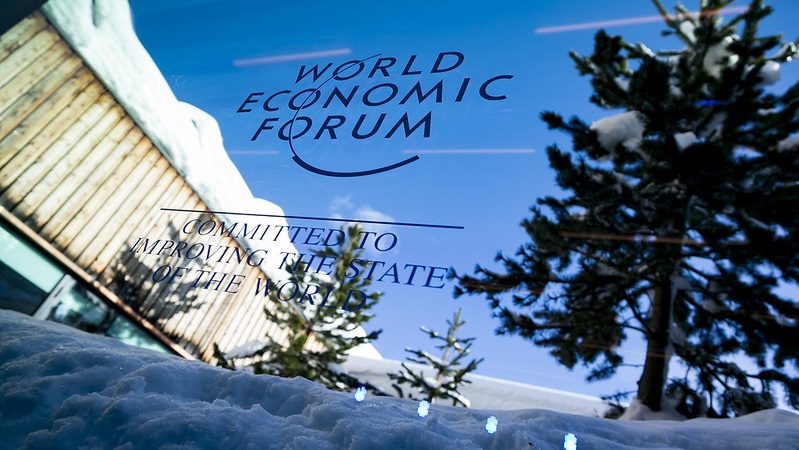The world’s elite is waking up to the impacts the climate crisis will have on the global economy if the growth of greenhouse gas emissions continues unabated.
Business leaders, investors and policy-makers have ranked climate and environmental risks the top five most likely long-term threats to the global economy.
The findings published in the World Economic Forum’s global risks perception survey come as the rich and powerful are due to gather in the Swiss resort of Davos next week.
Climate action is high on the summit’s agenda and Greta Thunberg is one of a number of youth activists travelling to Switzerland for the occasion. Watch out for a possible showdown on climate change with Donald Trump, who is also due to attend.
Business and political leaders will need to have more than ‘saying-the-right-thing’ speeches if their climate concerns are to be taken seriously.
Some of the world’s most influential companies have already taken the jump.
BlackRock, the world’s largest fund manager, named climate change a key factor in affecting economic growth and financial markets and pledged to put sustainability at the centre of its investment strategy.
Meanwhile, Microsoft has promised to be “carbon negative” by 2030 and hopes to remove enough carbon to account for all the direct emissions the company has ever made by 2050.
The pledges speak to the growing pressure investors and employees are putting on companies to take meaningful climate action. Will the Davos circus bring new commitments to action? Let’s see.
Biodiversity goals
Can countries agree to protect at least 30% of the world’s land and seas by 2030 to halt the destruction of biodiversity?
That’s the goal outlined by the Convention for Biological Diversity in a draft global framework to protect the planet’s plants and wildlife. A biodiversity summit in China in October will decide what goals to adopt for 2030.
Biodiversity talks are not immune from political positioning. Expect tough negotiations ahead.
Bridging climate polarisation
Australia’s bushfire crisis has exposed the difficulty of battling environmental hazards when politicians are split about how much to blame climate change.
Bushfire experts are calling for a nation-wide conversation about building resilience to anticipated prolonged and more intense fire seasons.
“We need to re-invent and re-think the management of our landscape,” Peter Kanowski, professor of forestry at the Australian National University told CHN. “In the face of climate change, land management will require more intervention not less.”
Australia’s scientific community is not short of propositions to mitigate the impacts of future bushfires. But can that conversation overcome the political divide?
Blame-game
Cop25 president Carolina Schmidt has accused Brazil, Australia, China and the US for the low-ambition outcome of the climate talks.
During a grilling at Chile’s Congress, environment minister Schmidt said she was not satisfied by the final Cop decision but “did not feel shame”.
Opposition lawmakers accused Schmidt of having personally bungled the negotiations – a sentiment echoed by some climate campaigners who accused Chile of “weak leadership”. Francisco Parra reports.
Cash to switch
The EU Commission has put money where its mouth is and unveiled a €100bn plan to put flesh on the bone of its Green Deal.
The money, which includes a €7.5bn Just Transition Mechanism fund, is designed to help communities across Europe move away from fossil-fuel intensive industries.
Poland is on track to be the fund’s largest recipient, with an allocated €2bn – a large carrot for Warsaw to back the union’s carbon neutrality goal by 2050.
Under the plans, Germany would receive the second biggest trunk of cash as Angela Merkel’s government agreed a €40bn coal phase-out deal with the country’s coal-producing regions.
Costly coal
China’s growing role as the source of coal projects in the Balkans could impede Bosnia and Serbia’s efforts to join the EU.
Documents obtained by Unearthed show the costs of two Chinese-backed coal power plants have been hugely under-estimated, potentially leaving taxpayers on the hook to pay for future carbon costs, Eleanor Rose reports for CHN.
Quick hits
- Australia’s climate change polarisation hampers long-term bushfire fixes
- Climate change tops risks for world in 2020 – Davos report
- Cop25 president Carolina Schmidt blames big emitters for low-ambition climate talks
- Germany agrees pay-out to states and companies in coal phase-out deal
- EU reveals climate fund details as critics worry cash won’t be enough
- China-backed coal plants on EU’s doorstep hide huge carbon costs
- UN outlines 2030 goals to save planet’s biodiversity
